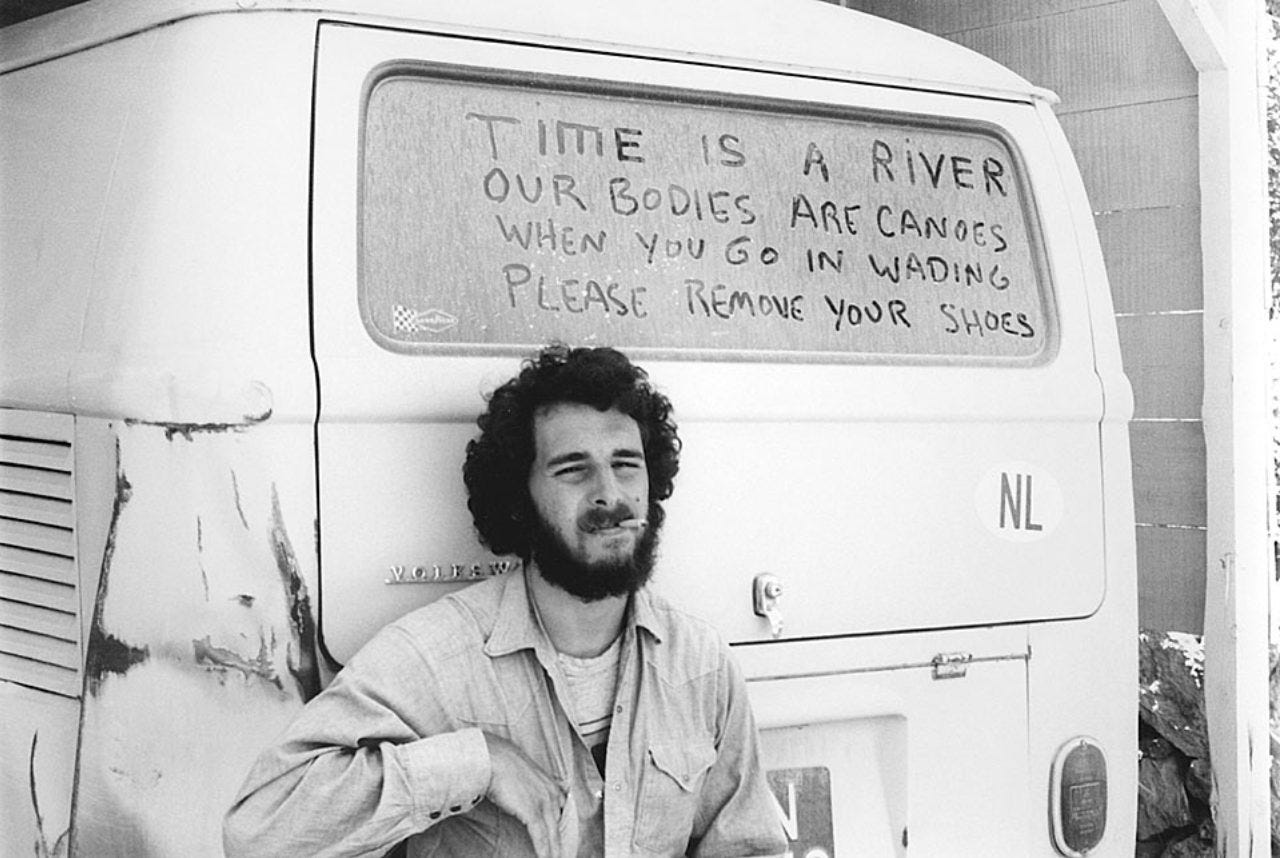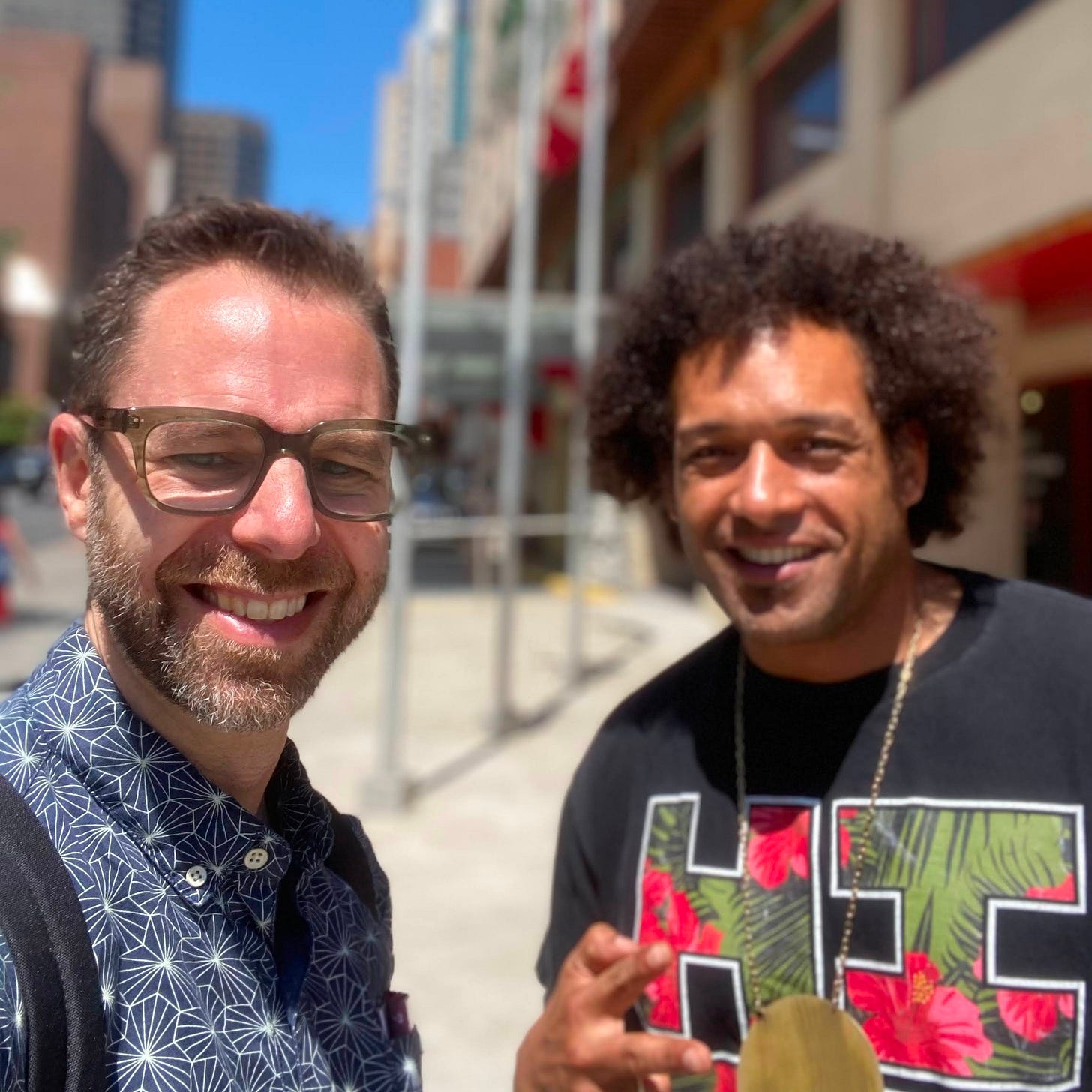Conversations Across Time: Makaya McCraven, Beat Scientist
"Beat scientist" Makaya McCraven reflects on time, rhythm, and pushing creative boundaries.
“Time is a river, our bodies are canoes. When you go wading in, please remove your shoes.”
Those are not my words; they are my father’s. He wrote them on the rear window of a VW bus during a trip to Ibiza sometime in the early 70s. Then he posed for a photo in front of his poem, a joint in his mouth and a look on his face that seemed to say, “Go ahead and try me.” It’s an image I know intimately, and an idea that became fundamental to my understanding of the human experience.
When I was a young boy, my dad gave me a drum set, and we started playing music together, embarking on a decades-long pursuit of the groove. At no point was this treated as trivial. The drums were as serious as the most profound text, the deepest thought, or the most exalted prayer. Sure, we had fun, but it was serious fun.
Because to groove is to merge onto the universal highway, to touch the divine, to dip your toe into the eternal current. The groove is about forward motion, but it happens one moment at a time.
We understand the past is behind us and the future is ahead. But all we can touch is the ever-unfolding present. The incessant march of time always appears in the same disguise. No matter when we look for it, it’s always the same time. It’s always right now. Our bodies may move through space, but time moves through us.
But the only way we seem to measure time is through human-made systems. A clock, a metronome, a song—all of these are ways to make rhythm, to process the passage of time.
To play rhythm well, it’s said that one must have good time. But what is good time? Is there such a thing as bad time? Can some time be better than other time? Perhaps. Because time marches on, but it takes a good drummer to find your way through the parade.
“Rhythm is the only way that we really deal with time as humans. You want to know how much time went past, you need a clock, you need a bpm. We need to make a rhythm to try to process time going by.”
Those aren’t my words. Those are Makaya McCraven’s.
Beat science
The first time I met Makaya McCraven was in 2021, outside a hotel in Cleveland. I was waiting to surprise my dad, who was giving a presentation at the Cleveland Jazz Festival. Makaya was leaning against the front door of the hotel, waiting for a ride to his soundcheck. We chatted briefly, and when I told him I was there to surprise my dad, he said, “I hope my son does that for me someday.”
As the cab pulled up, Makaya watched my family reunion and smiled as my dad and I embraced.
The next time we met was nine months later, in Montreal, where I was covering the Montreal Jazz Festival for WBGO. Makaya was an Artist in Residence, performing a series of shows throughout the week with different configurations of musicians.
Makaya is a coveted Artist in Residence because he always has a lot of collaborative projects going on. He’s a drummer, producer, and composer who calls himself a “beat scientist” and has been referred to as a “cultural synthesizer.” His work often walks the line between improvised and produced. He is a formidable drummer who believes deeply in “relinquishing to the moment” and thrives in the uncertainty of improvisation. It’s something that runs deep in him—both his parents are musicians. His father, Stephen McCraven, is a jazz drummer, and Makaya grew up among improvising musicians in the creatively rich enclave around Northampton, Massachusetts.
His mother, Ágnes Zsigmondi, is a Hungarian-born singer who exposed him to Eastern European folk traditions and expanded both his cultural awareness and his understanding of “time.” Growing up in the 90s, he was also inspired by hip hop and modern sounds. His band Cold Duck Complex played live-instrument hip hop, akin to The Roots, and toured the East Coast.
From early on, Makaya understood that categories were meaningless. “All the music that’s around us is flowing through us, and you can choose when you want to express that or not, but you can’t find me a musician in the world that hasn’t been influenced by rock and roll, pop music, electronic music, and technology. It’s just being present,” he tells me.
Like many musicians of his generation, he struggled to integrate his diverse influences into a coherent vision. But when he moved to Chicago nearly 20 years ago, he began to find his throughline. Today, he is known for making evocative records that explore the edges of sampling, live performance, and recontextualized sounds. His 2015 album In The Moment was built from hours of live performances in Chicago, adapted into compositions through sampling and remixing. It reflected his desire to reach a younger audience and break away from what he saw as the stilted formality of live jazz.
In The Moment, he told me, was all about “being fully present. Sometimes that can be elusive or fade. But ultimately, the goal is to surrender to the moment. Improvisation is an innate part of being in the world, being human, and having consciousness.”
He followed that with projects that explored themes of community, space, time, tradition, and innovation. His 2018 album Universal Beings consisted of augmented live sessions across Chicago, New York, London, and Los Angeles, and featuring collaborations with Shabaka Hutchings, Brandee Younger, and Carlos Niño among others. It honed his technique of transforming improvised moments into produced records. He eventually applied this approach to the Blue Note Records catalog for his 2021 album Deciphering The Message, where he reimagined classic recordings by the likes of Art Blakey, Hank Mobley. “It’s using the fabric of our culture to make new shit,” he says.
His records sound old and new, nostalgic and futuristic, reverent and provocative. They could only be made by someone fluent in tradition and brave enough to break with it.
Back in 2022, Makaya and I had breakfast and walked around Montreal’s Chinatown. We settled in at a coffee shop, where he told me about his then-upcoming album In These Times. “It’s about time and space,” he said. “Literally with rhythm, but also culturally. We’re living in these times. No matter what’s happening, you’ve always got one foot in the past, one foot in the future, and you can’t escape being in these times.”
In These Times came out in 2022, and like so much of his work, it is of its time yet timeless.
Earlier this month, I spoke with Makaya again at NYC Winter Jazzfest, where he was once again an Artist in Residence. This time, he reflected on the last 10 years and celebrated the anniversary of In The Moment. We spoke for the festival’s Jazz Talks series.
As I edited the two interviews for a podcast episode —one from 2022 and one from 2025—I found myself swimming in a space where past and present flowed together, much like Makaya’s work.
What you have here today is a hybrid interview, remixed across time. You’ll likely know when we’re where: 2022 is the cafe—clinking glasses, milk steamers, ambient noise. 2025 is the public interview—enhanced with a touch of echo.
“The goal is to surrender to the moment. Improvisation is an innate part of being in the world, being human, and having consciousness.” - Makaya McCraven








Great episode. Left me wanting more.